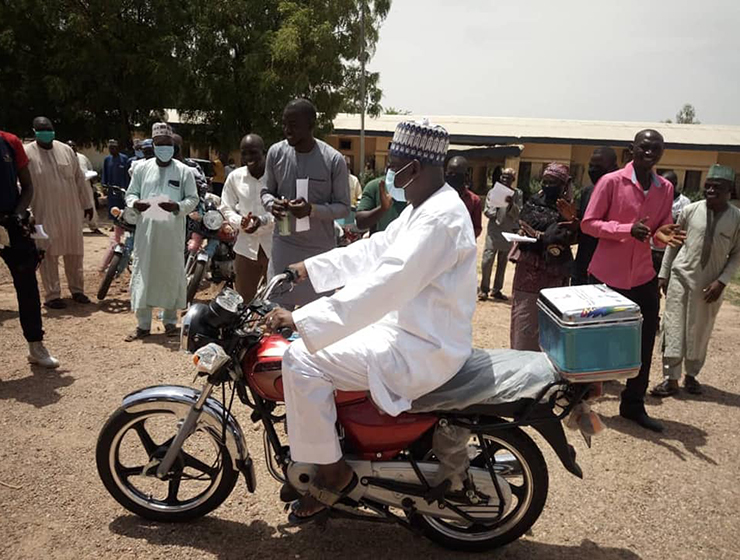
By training agricultural extension officers in Farmer Field School methods and equipping them with motorbikes, the RFS Nigeria project is working to scale up sustainable agricultural practices in Gombe State.
In a world under climate change threat, farming has become increasingly knowledge-intensive. Access to modern inputs is no longer a guarantee of success. Farmers must understand when and how to best to use these inputs (seeds, fertilisers, water, machinery, etc.) to increase productivity, while also rehabilitating and safeguarding national resources for current and future generations.
This new paradigm calls for new approaches to agricultural extension, approaches that emphasise innovation, knowledge exchange, and broad-based participation.
With the support of FAO, RFS country projects are increasingly turning to the Farmer Field Schools (FFS) approach as an alternative to traditional extension models. Farmer Field Schools encourage hands-on group learning, improve skills for critical analysis and allow for better decision-making by local farmers. FFS activities are field-based and promote experimentation and innovation to solve local problems. Farmers learn how to improve skills through observing, analysing and trying out new ideas in their own fields, contributing to improved and more sustainable production and livelihoods.
At the heart of the FFS approach is the training of facilitators who will support the FFS process and lead regular meetings and learning exchange.
In Nigeria, UNDP has begun training local agricultural extension officers in Gombe State. Twenty extension officers, covering ten project communities in the Kaltungo and Balanga Local Government Areas, attended the three-day training at the beginning of July. Training facilitator, James Sinang, who was previously the Master Trainer at the Gombe State Agricultural Development Programme, led training sessions on FFS objectives and principles, the characteristics of the FFS approach, and adult learning methods.
Training local officers as FFS facilitators leads to higher levels of success as community members have a keen understanding of context and have base level of trust with other farmers within the community. These facilitators are more motivated to return home with useful skills and knowledge to share with their peers. The empowerment of local farmers strengthens community ownership of the project and is an effective strategy to secure sustainability and scale.
Shur’abil Idris, an extension agent from the Dogon-Ruwa community of the Kaltungo Local Government Area, said that as a resident of the area who has knowledge of the local terrain, he felt confident he could share new knowledge and encourage experimentation with farmers. “An extension worker is a friend to the farmer all the time. So I will make sure that I am with them and interact with them all the time,” Idris said.
The extension officers recognise that farmers already have a lot of knowledge about their environment and their farming system. Farmer Field Schools are meant to supplement that knowledge with new information and technologies that will improve the production and resilience of the system. The application of such knowledge often means that farmers have to acquire new skills of various kinds: technical skills to operate unfamiliar equipment, organisational skills to manage a group project, or farm management skills for keeping records and allocating the use of farm resources and equipment.

To further maximise the impact of the FFS training, 84 motorcycles were distributed to all extension officers who serve communities in the Kaltungo and Balanga Local Government Areas. For the newly trained officers, the motorbikes are a means of transportation across difficult terrains in order to spread the knowledge they acquired during the FFS training. As extension worker, Yusuf Ayuba Bishara, explained, “The motorbikes will help us deliver extension services, because most of us work in remote and difficult terrain, which only motorcycles could reach.”
Ultimately, the road to ecosystem resilience is best reached by improving the sustainability of existing systems. Smallholder farmers already know what works; facilitated modernisation and training via Farmer Field Schools enhances this local knowledge and allows for the scaling up of proven solutions. In Nigeria, the RFS project will continue to promote participatory learning-by-doing approaches to more farmers, in more remote areas, to better equip communities with the tools they need to tackle present and future challenges.
Subscribe to our monthly newsletter to receive updates on stories directly from the field across all our projects, upcoming events, new resources, and more.